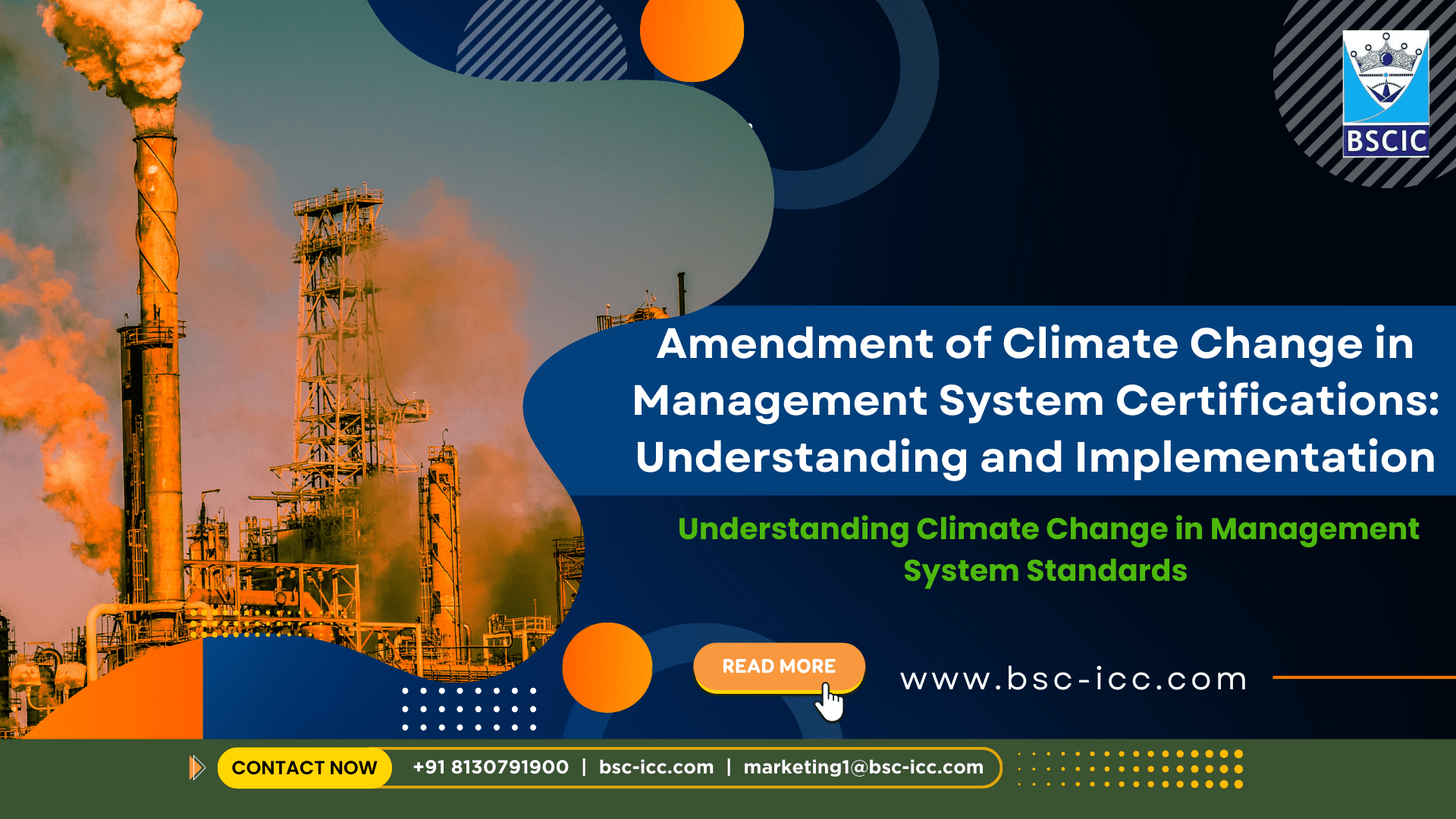
Amendment of Climate Change in Management System Certifications: Understanding and Implementation
Introduction:
In support of the ISO London Declaration on Climate Change, ISO passed a resolution that is resulting in two new statements of text being added to a number of existing management systems standards, and will be included in all new standards under development/revision, to address the need to consider the effect of Climate Change on the ability to achieve the intended results of the management system. The changes are to be introduced initially as Amendments to these published standards.
Climate change has become a critical consideration for organizations worldwide, prompting amendments to various ISO Management System Standards. The integration of climate change considerations into MS standards aims to ensure organizations address this pressing issue within their quality management systems. This article provides guidance for auditors on effectively auditing climate change issues within the MS standards framework.
Understanding Climate Change in MS standards Context:
The revised clauses 4.1 & 4.2 of MS standards emphasize the need for organizations to determine whether climate change is a relevant issue affecting their ability to achieve the intended results of the management system. This entails considering external and internal factors, such as regulatory requirements, customer expectations, and strategic direction.
The orientation of changes made in clauses 4.1 & 4.2 of MS Standards are stated as below:
4.1 Understanding the organization and its context.
The organization shall determine external and internal issues that are relevant to its purpose and that affect its ability to achieve the intended result(s) of its XXX management system.
Added: The organization shall determine whether climate change is a relevant issue.
4.2 Understanding the needs and expectations of interested parties.
The organization shall determine:
- the interested parties that are relevant to the XXX management system.
- the relevant requirements of these interested parties.
- which of these requirements will be addressed through the XXX management system.
Added: NOTE: Relevant interested parties can have requirements related to climate change.
The intent is to ensure that Climate Change issues are considered by the organization in the context of the effectiveness of the management system, in addition to all other issues. These additional statements in each management system standard ensure that this important topic is not overlooked but considered by all organizations in the design and implementation of the management system.
The overall intent of the requirements for clauses 4.1 and 4.2 remain unchanged; these clauses already include the need for the organization to consider all internal and external issues that can impact the effectiveness of their management system; these new inclusions are assuring that Climate Change is considered within the management system and that it is an external factor that is important enough for our community to require organizations to consider it now.
It should be noted that Climate Change can have a different effect on each management system component; for example, the effect on a Quality Management System could be very different to that on a Health and Safety Management System.
It is not the intention of the changes to (for example) turn a health and safety management system audit or a road traffic safety management system audit into one that disproportionality considers Climate Change, though this does not of course understate the importance of Climate Change.
IAF and ISO would like to emphasise that Climate Change is a vital topic and, while the addition of climate considerations is highly important, the standards have always included the need for all issues affecting the management systems to be considered by the organization. Therefore, many organizations implementing Management System Standard(s) will already be taking Climate Change into account.
Client Organizations Considerations:
Considering the severity of this topic and global concern of climate change, client organizations are requested to focus on considering climate change as a relevant issue while designing and implementing of the management system considering the boundaries of their scope of work and organizations should also take care of communicating the same to their relevant interested parties like vendors, suppliers, service providers etc. about their required amendments in product/ service provision related to climate change.
Auditing Considerations:
Auditors need to evaluate several key aspects:
- Determination of Relevance: Has the organization identified climate change as a relevant issue?
- Alignment with Requirements: Are the organization's determinations aligned with statutory, regulatory, and contractual obligations?
- Impacts on MS standards: Assess the potential impacts of climate change on the Management System standards processes, products, and services, considering factors like changes in regulations, market trends, and supply chain vulnerabilities.
- Addressing Relevant Issues: Evaluate how the organization addresses identified climate change issues within the MS standards framework, including risk assessment, operational changes, and resource allocation.
Auditing Climate Change Impacts:
- Auditors should focus on auditing processes related to context analysis, risk assessment, and compliance with relevant requirements. They should ensure that the organization has:
- Identified and addressed contractual, regulatory, and customer requirements related to climate change.
- Implemented necessary changes to the Management System standards scope, processes, and controls and other variables to address climate change impacts.
- Validated any claims or commitments related to climate change, ensuring they can be met effectively.
Conclusion:
Auditing climate change issues within the framework of ISO Management System Standards requires a comprehensive approach, considering both internal requirements and external regulatory and stakeholder expectations. Auditors play a crucial role in assessing how organizations integrate climate change considerations while implementing management system standard(s), ensuring compliance(s), effectiveness, and continual improvement; with proper guidance and evaluation, organizations can enhance their resilience to climate change while maintaining Management System standard’s effectiveness and customer satisfaction.

